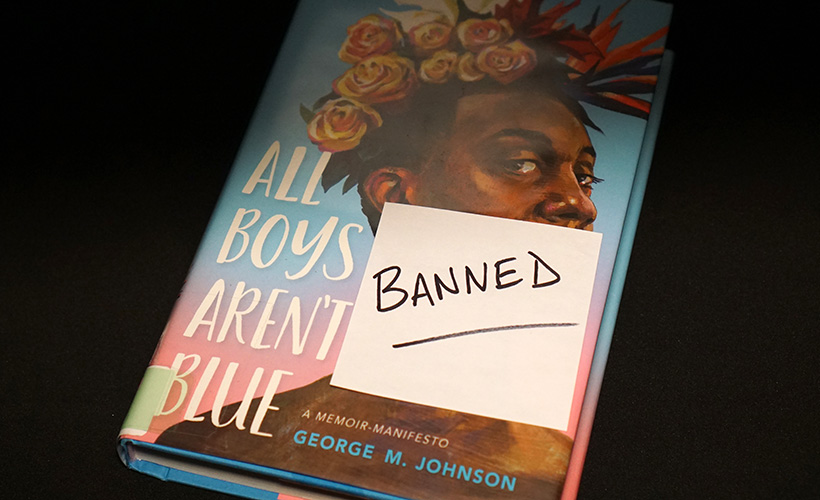You’ve heard it in the news and seen it across social media: book challenges are on the rise. In 2021, the American Library Association (ALA) documented hundreds of challenges to 1,597 individual titles. That’s the highest number since the organization began tracking twenty years ago. And it’s likely a vast undercount, as surveys indicate that 82–97% of book challenges are never reported. Even if your library has never faced a challenge before, you might be wondering: could it happen here? Yes, but there are things you can do to prepare your library to respond effectively.
Understand Library Values
The first step is to develop a solid understanding of the professional values that lead libraries and librarians to support the freedom to read. These principles guide the policies and actions you will implement later.
Libraries defend intellectual freedom, or the right of all people to learn from all points of view. The Library Bill of Rights states that “books and other library resources should be provided for the interest, information, and enlightenment of all people of the community the library serves. Materials should not be excluded because of the origin, background, or views of those contributing to their creation.” Additionally, “materials should not be proscribed or removed because of partisan or doctrinal disapproval.” Libraries respond to challenges not by arguing about the merits of a particular title, but by emphasizing the right of every person to access the books that they choose.
Libraries also have an ethical obligation (see ALA Code of Ethics, principle #9) to uphold diversity, equity, and inclusion. Books by and about people from excluded and minoritized communities are particularly likely to be challenged. The top three most banned and challenged books in 2021 (Gender Queer by Maia Kobabe, Lawn Boy by Jonathan Evison, and All Boys Aren’t Blue by George M. Johnson) were all targeted due to LGBTQIA+ content. Books dealing with issues of race or by BIPOC creators are also consistently among the most challenged books each year. Libraries defend the rights of people from all backgrounds and experiences to tell their stories, and the rights of all readers to access them.

One way to proactively communicate the library’s values is by participating in Banned Books Week. Observed annually in September, Banned Books Week is a celebration of our freedom to read. Supported with many resources like downloads, promotional materials, and display and program ideas, libraries of any size can find fun and meaningful ways to get involved.
Formally Adopt Clear Policies and Procedures
A simple yet essential protection for libraries is to proactively adopt clear policies and procedures for reconsideration. In the event of a formal or informal challenge, both the complainant and the library will be aware of their roles and know what steps to follow. Trained staff may be able to de-escalate a patron concern before it becomes a formal challenge. If a formal challenge is filed, having a policy prepared in advance provides structure and clarity to staff at a stressful time. It also assures the community that all items and perspectives are being treated fairly. Additionally, the policy gives the library an opportunity to frame the discussion with its values and selection criteria. Don’t have a policy, or ready for a refresh? These resources can help you get started.
- Selection and Reconsideration Toolkit for Public, School, and Academic Libraries from ALA provides a robust description of how to craft policies and procedures, including sample forms.
- Intellectual Freedom Manual, Tenth Edition (Garner and Magi, 2021) is the authoritative resource on intellectual freedom policies and practices in libraries. It contains information and guidance that is important to creating policy, such as a section on responding to requests for reconsideration.
Get Support
The most important thing to remember in the face of a challenge is that you are not alone. Trusted organizations around the country are ready to provide you with resources and support.
- ALA’s Office of Intellectual Freedom (OIF) provides comprehensive support. If someone challenges an item in your collection, you can report the challenge to OIF. OIF can help you determine the best way to respond. They can also help you coordinate with other supportive associations or resources in your state. In addition, your report helps other libraries by giving OIF a better picture of where and how issues are arising. You don’t even have to wait for a challenge—OIF provides free consulting to help you prepare your policies, find training, and more.
- #FReadom Fighters was founded by a group of Texas school librarians who were facing challenges and censorship. They came together “to tell positive stories of libraries and books for our students.” Their site is rich with practical resources that are applicable to many types of libraries, such as talking points for common community questions, templates for letters of support, and how-to steps for speaking at a public meeting.
- Unite Against Book Bans is a campaign to support grassroots organizing against book bans. With tested messaging, instructions for organizing a protest or starting a petition, fundraising tools, social media graphics, and more, the campaign can help communities prepare for or respond to a challenge. (Remember to keep your political activism or fundraising activities separate from your workplace.)
Other Ways to Get Involved
Feeling fired up about fighting censorship? Want to learn more about any of these topics? In addition to the organizations listed so far, there are many ways to get involved.
- Join the Freedom to Read Foundation. FTRF is a nonprofit First Amendment legal support organization. Through legal advocacy, education, and grant-making, they uphold the right of all people to engage freely with ideas.
- Volunteer for state and national committees. State library associations often have intellectual freedom sections or committees. Any ALA member can join its Intellectual Freedom Round Table (IFRT). There are multiple IF and DEI committees across the organization and its divisions. These are great places to learn while you make a difference.
Every person deserves the right to decide for themselves what they want to read or learn. By understanding our core values, proactively documenting sound policies and procedures, and turning to our professional community for support, libraries can uphold this essential democratic freedom for our communities.
See also:




